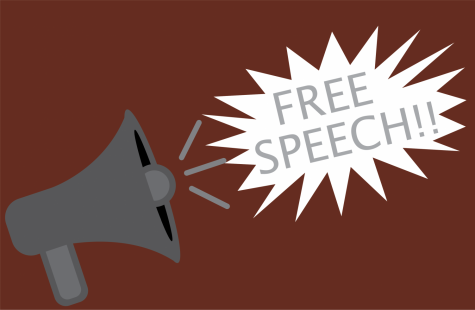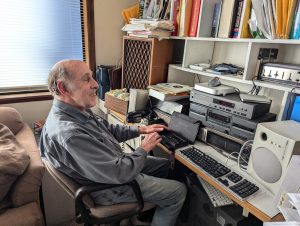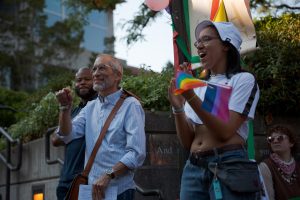Free speech at SPU isn’t the issue
September 30, 2021

The topic of free speech at Seattle Pacific University and on college campuses across the country has recently become a topic of much contention.
Organizations like Turning Point USA and the Foundation for Individual Rights in Education make the claim that free speech is under attack and that Conservative political and cultural ideals are being forced out in favor of political correctness. Former President Donald Trump even signed an executive order in 2019 that demanded publicly funded universities extend the freedom of speech to everyone on campus.
But is free speech even being threatened at all, or are people just afraid of accepting the consequences of their actions?
The idea of free speech in America comes from the First Amendment, which prohibits the government and public institutions from denying people the right to express their beliefs. Simply put, people are allowed to believe and say whatever they want, so long as their words don’t incite harm to others (Chaplinsky v. New Hampshire).
This is a very important right that we have in this country, but it is often misunderstood.
While any individual can publicly say anything, so long as it doesn’t cause harm to other people, the public can say whatever they want in response. In that situation, the public is not violating the individual’s free speech at all; they are simply expressing their own free speech.
An argument could be made that the freedom of speech is being violated at SPU if, and only if, the Board of Trustees declared that certain ideas or ideologies were not allowed to be expressed on campus. This hasn’t happened, though, and there are no signs of that ever changing.
So, what even is happening, and why is SPU having this conversation?
In his recent article for The Falcon, alumni Carl Cederborg makes the claim that students who are accused of “any myriad of so-called ‘phobias’” are being ostracized and people are no longer putting politics aside to agree to disagree. This apparently is a sign that free speech on campus is in a “perilous state.”
I struggle to see how this ostracization for holding homophobic, Islamophobic, or transphobic ideas (which Cederborg brings up as examples) is even a problem, much less a sign of declining free speech. If most students at SPU are refusing to accept discriminatory ideas and are ostracizing those who hold them, then they’re just expressing their own right to free speech, not violating anyone else’s.
No one at SPU is being censored (as evidenced by the article in question), and last year’s decision by the Board of Trustees to keep their homophobic hiring policy proves that the people in power at this school certainly aren’t going to stop or punish anyone who is accused of or holds homophobic beliefs. So, it must be asked, in what way is your free speech even being threatened?
The problem here seems to be that free speech at SPU isn’t being threatened at all, but rather people’s actions now have consequences. This seems to be upsetting for those who refuse to reflect on the ways in which their beliefs and words can harm others. Hateful beliefs inspire hateful actions, and those that would be harmed by those actions have every right to refuse to associate with it.
Even if Cederborg was correct about the “perilous state of free speech” at SPU, students shouldn’t have to interact and associate with hateful ideas, especially ideas that are hateful to them specifically. A person’s sexual, religious, and gender identity is an immensely important part of who they are and refusing to associate with these “so-called phobias” is how identities that aren’t either straight, cisgender, or Christian will become accepted and part of everyday life. This hardly seems like a problem.
There are still many healthy political discussions and disagreements at SPU, but if your politics amount to not accepting another person for who they are, why should anyone else have to abide by that? The only eggshells that “folks right-of-center” have to walk on deal only with the question of being an accepting and humane person. No one is being ostracized for wanting taxes to be lower or for preferring less government control.
People’s identities aren’t politics.


























































































Cassie • Oct 12, 2021 at 5:25 pm
Ah, finally, someone who understands what free speech actually means. Thank you!
Brad Fry • Sep 30, 2021 at 5:29 pm
Thank you for a thoughtful piece that reflects the ideals that faith-based organizations should be modeling for the rest of world (instead of the other way around).